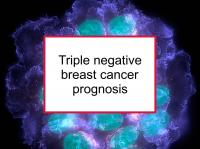Younger women with triple negative breast cancer tend to have a worse outcome than older women. In particular, age younger than 40 years at diagnosis is a significant unfavorable prognostic factor among women with triple negative breast cancer, independent of lymph node status, tumor size and use of chemotherapy.
The evidence regarding older women and triple negative breast cancer outcomes is mixed. The use of chemotherapy tends to be very limited in older women. Radiotherapy also appears to be underused in older women.
However, one study found that, despite not having received adjuvant chemotherapy, older triple negative women had outcomes similar to younger patients, almost half of whom had received chemotherapy. Another study of women at least 70 years old found that radiotherapy after lumpectomy significantly reduced breast cancer mortality in women older than 70 with Stage I, estrogen receptor negative (ER-) tumors. Still another study reported that women over 70 had significantly worse outcomes than those under 70 with triple negative disease, a finding that the authors supposed could be the result of less extensive treatment.
Below under Selected breast cancer studies are links to studies concerning the influence of age at diagnosis on triple negative breast cancer prognosis.
Additional triple negative breast cancer articles
Below are links to some other articles concerning triple negative breast cancer.
